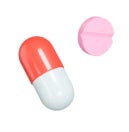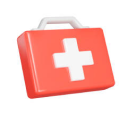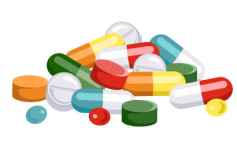SingHealth Duke-NUS Academic Medical Centre will NEVER ask you to transfer money over a call. If in doubt, call the 24/7 ScamShield helpline at 1799, or visit the ScamShield website at www.scamshield.gov.sg.
Naratriptan
Uses
What is Naratriptan for?
Naratriptan is a selective serotonin receptor agonist. It works by reducing inflammation and reversing the widening of blood vessels in the brain, thereby stopping a migraine headache. It is often used to treat a migraine attack after it begins. It will not prevent a migraine.
How should I take or use Naratriptan?
- Follow your doctor’s instructions as to how many tablets to take when the attack starts. It should work within 1-2 hours.
- If your migraine improves but comes back, wait at least 4 hours before taking the next dose. Do not take more than 2 tablets (5mg) per day.
- If you have kidney or liver impairment, do not take more than 1 tablet in 24 hours.
- Do not use naratriptan too frequently (limit of 10 days per month), as it can cause medication overuse headache (migraine/headache may worsen). Inform your doctor if you need to take naratriptan to treat more than 4 headaches in a 1 month period.
- You may take this medication with or without food.
- If the tablets did not give you enough help with your migraine, consult your doctor.
Precaution
What precautions should I take when taking or using Naratriptan?
Inform your healthcare professional if:
- You are allergic to this medication or any of the other ingredients of this medication.
- You have a history of heart condition or stroke, uncontrolled blood pressure, blood circulation disorders, kidney or liver diseases.
- You are allergic to antibiotic that contains sulfonamide.
- You are taking medications under the class of selective serotonin reuptake inhibitors (SSRI) e.g. fluoxetine, serotonin and norepinephrine reuptake inhibitor (SNRI) e.g. venlafaxine or monoamine oxidase inhibitors (MAOI) e.g. isocarboxazid, phenelzine, tranylcypromine.
- You are pregnant, planning to become pregnant, or breastfeeding.
- You are taking any other medications, including supplements, traditional medications and herbal remedies.
What food or medication should I avoid when I take or use Naratriptan?
Avoid taking different triptans (e.g. zolmitriptan, sumatriptan, etc.) or ergotamine preparations (e.g. Caffox, Cafergot) within 24 hours after taking naratriptan.
Side Effects
What are some common side effects of Naratriptan?
-
Dizziness, drowsiness, weakness
- Do not drive or use machinery
- Do not drink alcohol when taking this medication
-
Pain or tightness in your throat or jaw
- If pain is intense and does not go away, please seek medical attention
- Nausea, vomiting
- Tingling sensation
- Dry mouth
What are some rare but serious side effects that I need to seek medical advice immediately?
The symptoms of a drug allergy include one or more of the following:
- Swollen face/eyes/lips/tongue
- Difficulty in breathing
- Itchy skin rashes over your whole body
Signs and symptoms of serotonin syndrome such as:
- Feeling agitated and restless, other mental changes such as hallucination
- Heavy sweating, shivering
- Fast heart rate, irregular heartbeat
- Rigid or twitching muscles
- Nausea, vomiting or diarrhoea
Signs and symptoms of a heart attack:
- Discomfort in the middle of your chest that lasts for a few minutes or goes away and comes back
- Shortness of breath with or without chest discomfort
- Chest pain or chest discomfort that feels like an uncomfortable heavy pressure, squeezing, fullness or pain
If you experience any of these symptoms, you should stop your medication and see your healthcare professional immediately.
Handling
How should I store Naratriptan?
Store in a cool and dry place, away from direct sunlight. Keep this medication away from children.
How do I throw away Naratriptan safely?
Pack this medication into a black trash bag and seal it tightly before throwing into the rubbish chute or bin.
Disclaimers
If you take more than the recommended dose, please seek medical advice immediately. The information provided on this page does not replace information from your healthcare professional. Please consult your healthcare professional for more information.
This article is jointly developed by members of the National Medication Information workgroup. The workgroup consists of cluster partners (National Healthcare Group, National University Health System and SingHealth), community pharmacies (Guardian, Unity and Watsons) and Pharmaceutical Society of Singapore. The content does not reflect drug availability and supply information in pharmacies and healthcare institutions. You are advised to check with the respective institutions for such information.
Last updated on Feb 2021

Need More Medicine?
Use Medicine Order Service on HealthBuddy.

Medicines Reminder
Get reminders and chart progress on HealthBuddy.
© 2025 SingHealth Group. All Rights Reserved.
















































